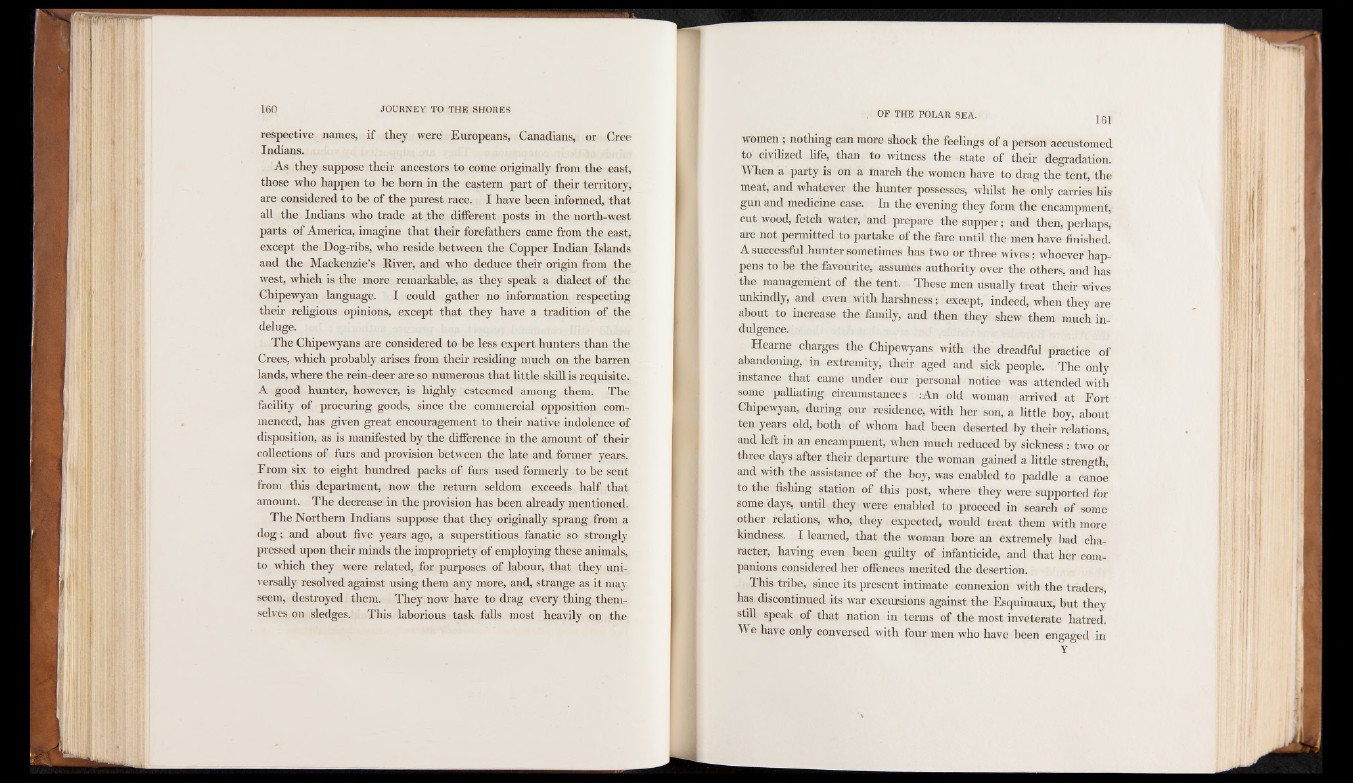
160 JOURNEY TO THE SHORES
respective names, if they were Europeans, Canadians, or Cree
Indians.
As they suppose their ancestors to come originally from the east,
those who happen to be born in the eastern part of their territory,
are considered to be of the purest race. I have been informed, that
all the Indians who trade at the different posts in the north-west
parts of America, imagine that their forefathers came from the east,
except the Dog-ribs, who reside between the Copper Indian Islands
and the Mackenzie’s River, and who deduce their origin from the
west, which is the more remarkable, as they speak a dialect of the
Chipewyan language. I could gather no information respecting
their religious opinions, except that they have a tradition of the
deluge.
The Chipewyans are considered to be less expert hunters than the
Crees, which probably arises from their residing much on the barren
lands, where the rein-deer are so numerous that little skill is requisite.
A good hunter, however, is highly esteemed among them. The
facility of procuring goods, since the commercial opposition commenced,
has given great encouragement to their native indolence of
disposition, as is manifested by the difference in the amount of their
collections of furs and provision between the late and former years.
From six to eight hundred packs of furs used formerly to be sent
from this department, now the return seldom exceeds half that
amount. The decrease in the provision has been already mentioned.
The Northern Indians suppose that they originally sprang from a
dog; and about five years ago, a superstitious fanatic so strongly
pressed upon their minds the impropriety of employing these animals,
to which they were related, for purposes of labour, that they universally
resolved against using them any more, and, strange as it may
seem, destroyed them. They now have to drag every thing themselves
on sledges. This laborious task falls most heavily on the
OF THE POLAR SEA.
women ; nothing can more shock the feelings of a person accustomed
to civilized life, than to witness the state of their degradation.
When a party is on a march the women have to drag the tent, the
meat, and whatever the hunter possesses, whilst he only carries his
gun and medicine case. In the evening they form the encampment,
cut wood, fetch water, and prepare the supper; and then, perhaps,
are not permitted to partake of the fare until the men have finished.
A successful hunter sometimes has two or three wives; whoever happens
to be the favourite, assumes authority over the others, and has
the management of the tent. These men usually treat their wives
unkindly, and even with harshness; except, indeed, when they are
about to increase the family, and then they shew them much indulgence.
'
Hearne charges the Chipewyans with the dreadful practice of
abandoning, in extremity, their aged and sick people. The only
instance that came under our personal notice was attended with
some palliating circumstances ;An old woman arrived at Fort
Chipewyan, during our residence, with her son, a little boy, about
ten years old, both of whom had been deserted by their relations,
and left in an encampment, when much reduced by sickness : two or
three days after their departure the woman gained a little strength,
and with the assistance of the boy, was enabled to paddle a canoe
to the fishing station of this post, where they were supported for
some; days, until they were enabled to proceed in search of some
other relations, who, they expected, would treat them with more
kindness. I learned, that the woman bore an extremely bad character,
having even been guilty of infanticide, and that her companions
considered her offences merited the desertion.
This tribe, since its present intimate connexion with the traders,
has discontinued its war excursions against the Esquimaux, but they
still speak of that nation in terms of the most inveterate hatred.
We have only conversed with four men who have been engaged in
Y